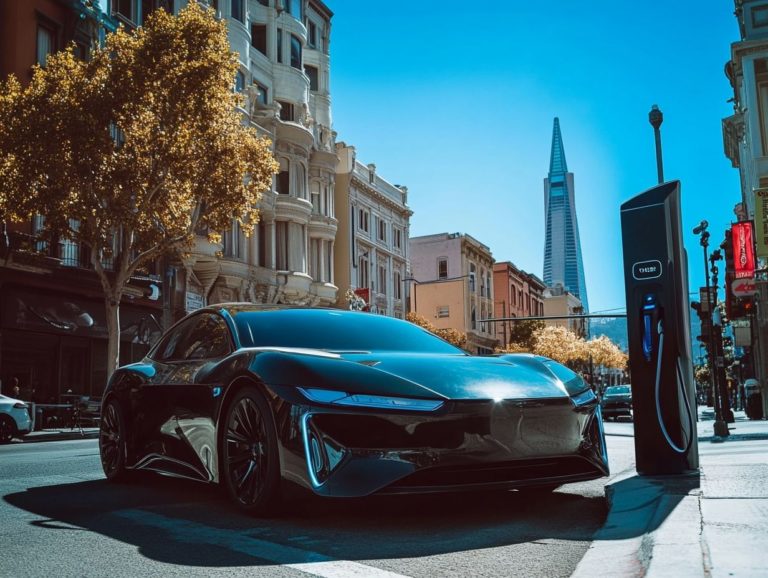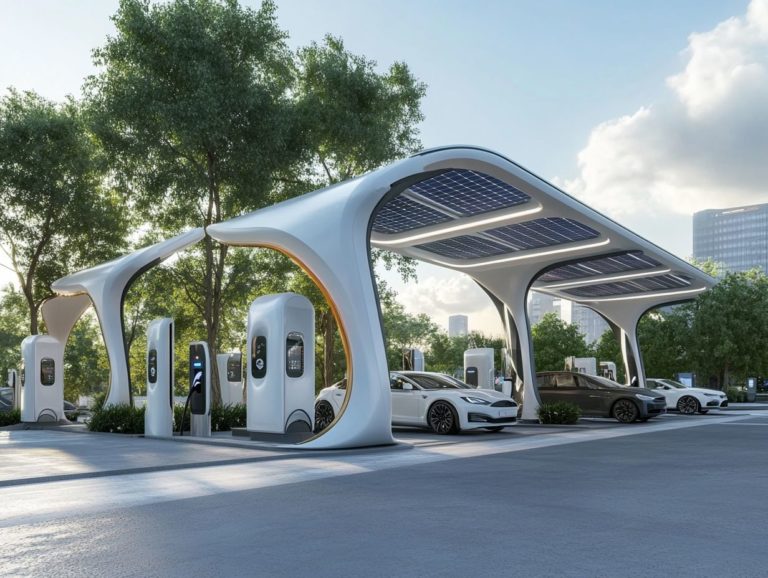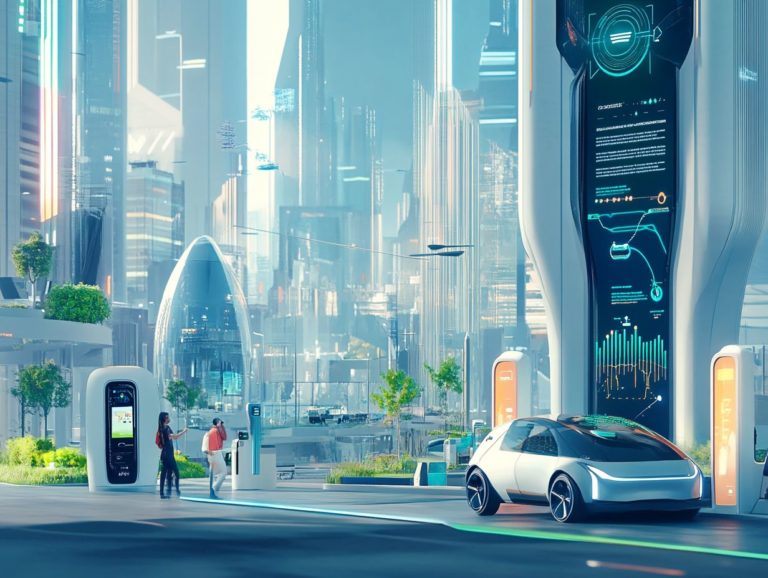40. common misconceptions about electric vehicles
Electric vehicles (EVs) are swiftly becoming a favored choice as a sustainable alternative to traditional cars. However, misconceptions frequently obscure their genuine potential.
This exploration delves into the prevalent myths surrounding EVs. We will highlight their environmental benefits while comparing costs and maintenance with conventional vehicles.
You may have concerns about range anxiety and charging infrastructure. Rest assured, those are addressed here, along with the thrilling advancements that could redefine the landscape of electric mobility.
Join us to uncover the facts and drive towards a greener future!
Contents
- Key Takeaways:
- Common Misconceptions about Electric Vehicles
- Environmental Impact of Electric Vehicles
- Cost and Maintenance of Electric Vehicles
- Range and Charging Concerns
- Future of Electric Vehicles
- Frequently Asked Questions
- Curious about electric vehicles? Here are some common questions answered!
- What are some common misconceptions about electric vehicles?
- Are electric vehicles actually slow?
- Do electric vehicles have limited range?
- Is it true that electric vehicles are not as environmentally friendly as traditional vehicles?
- Do electric vehicles require special charging infrastructure?
- Are electric vehicles more expensive to own and maintain?
Key Takeaways:
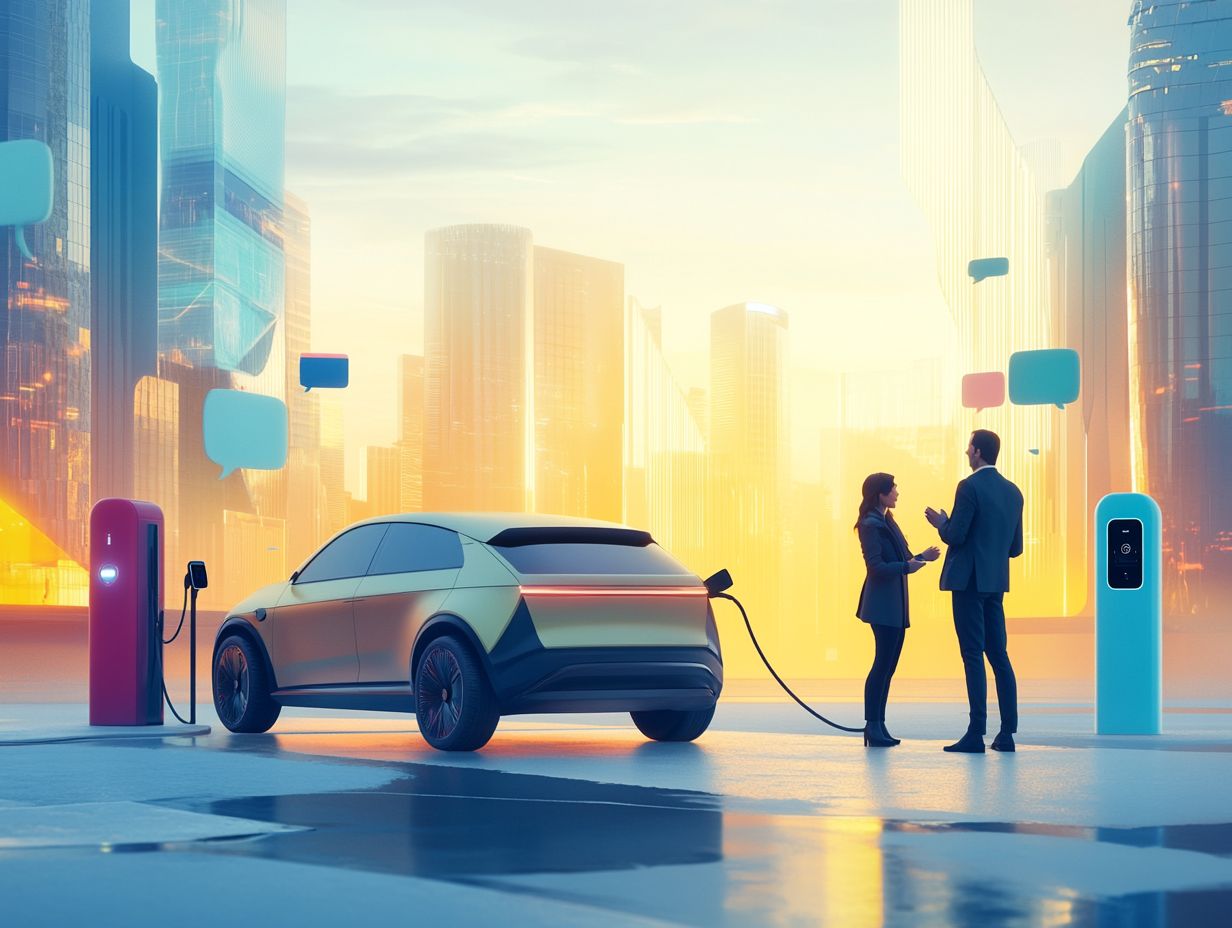
Electric vehicles have been around for over a century.
They provide environmental benefits and long-term savings.
What are Electric Vehicles?
Electric vehicles (EVs) represent a groundbreaking shift in the automotive landscape, designed to reduce your reliance on gas cars and significantly lower your carbon footprint.
Unlike traditional vehicles that rely on gas engines, electric vehicles use electric motors and rechargeable batteries, often supported by renewable energy sources. This makes them an important part of the transition toward a more sustainable power grid.
Models like the Tesla Model Y and Volvo C40 showcase this innovative technology, offering options including plug-in hybrids that seamlessly blend electric and gas functionalities.
Your journey into the realm of electric vehicles includes various types. BEVs are fully electric vehicles, while PHEVs combine electric power with gas.
An important part of EV technology is battery manufacturing. This not only propels advancements in energy storage but also highlights the importance of responsibly sourcing materials.
As these vehicles gain traction, their integration into the existing power grid presents challenges and opportunities, particularly regarding charging infrastructure and grid capacity.
Industry leaders like Tesla and Volvo are at the forefront of this evolution. They are championing cleaner alternatives and showing the potential of renewable energy sources such as solar and wind to power these vehicles. This commitment enhances their environmental benefits and supports the emergence of a greener economy.
Common Misconceptions about Electric Vehicles
Numerous myths surrounding electric vehicles have emerged, leading to widespread misunderstandings about their impact on carbon pollution and greenhouse gas emissions, as highlighted in the article 5 myths about electric vehicles debunked.
You might find that many consumers still have doubts about vehicle safety, battery sourcing, and the overall lifecycle emissions linked to electric vehicles. To address these concerns, it’s important to understand the reality behind these misconceptions, as highlighted in the article on 7 common myths about EV charging debunked. These doubts often lead to unfavorable comparisons with traditional gas cars.
As you explore these common misconceptions about EVs, it’s crucial to tell the difference between what’s true and what’s not. This enables potential buyers like yourself to fully appreciate the genuine benefits of embracing electric vehicles.
Myths vs. Facts
When examining the myths and facts surrounding electric vehicles, understanding common misconceptions about EV battery maintenance can reshape your understanding of their environmental impact and efficiency.
Contrary to popular belief, electric vehicles aren t solely responsible for greenhouse gas emissions tied to battery production. In fact, they often have a smaller carbon footprint over their entire lifecycle compared to gas cars especially when powered by renewable energy sources.
This perspective is vital, as studies from the U.S. Energy Information Administration reveal that charging an electric vehicle with clean energy can cut emissions by up to 80% compared to traditional vehicles.
The International Council on Clean Transportation shows that the efficiency of electric motors can surpass 90%. This makes them far more energy-efficient than gas engines, which generally operate in the 20%-30% range.
These findings collectively underscore that while misconceptions may run rampant, the truth is that electric vehicles offer a greener alternative for environmentally conscious consumers, especially when you consider the ev maintenance myths debunked.
Explore electric vehicles today and be part of a cleaner future!
Environmental Impact of Electric Vehicles
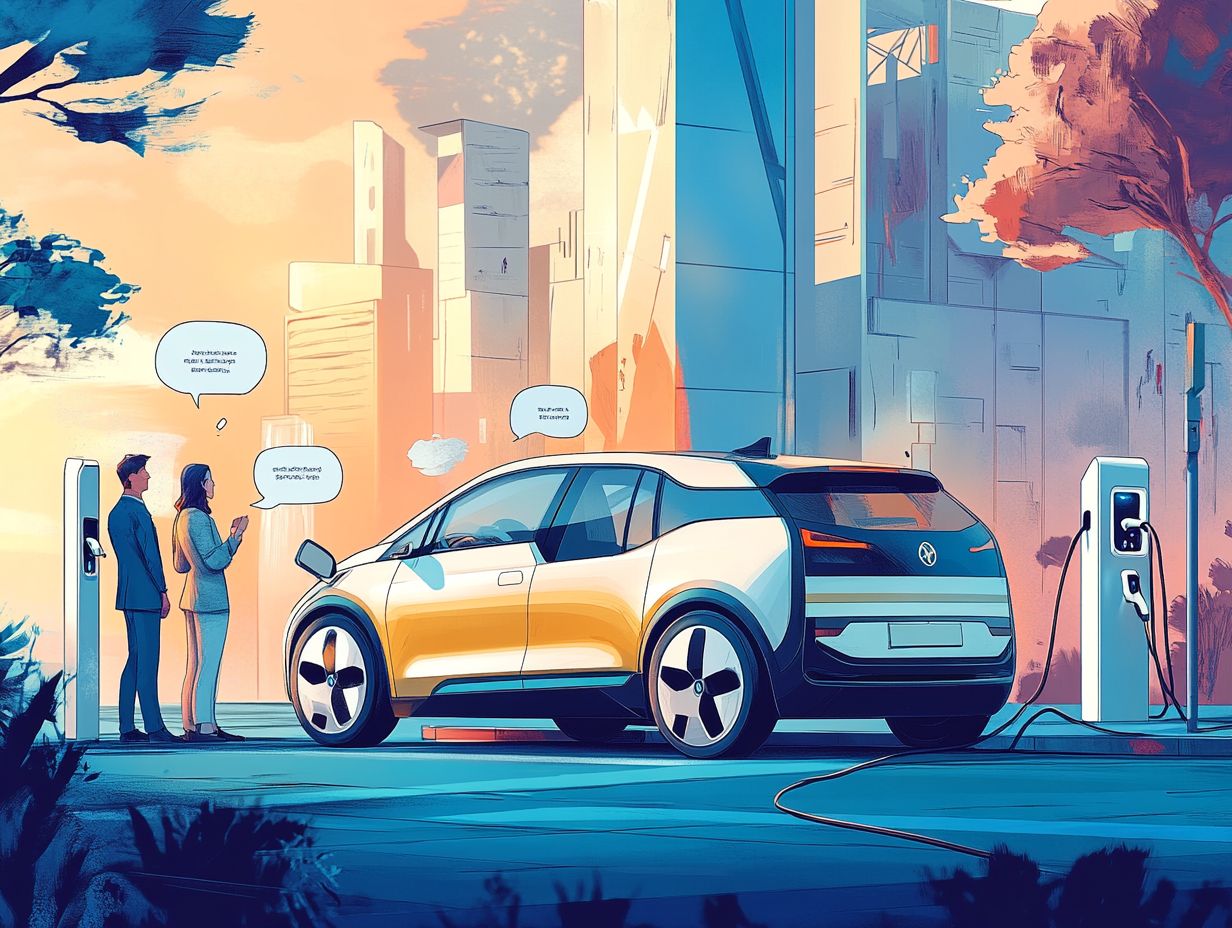
The environmental impact of electric vehicles is a crucial consideration in the global effort to combat climate change.
By driving electric, you significantly contribute to reducing emissions and lowering carbon footprints, reaping considerable climate benefits especially when these vehicles are powered by renewable energy sources.
Ongoing advancements in EV battery technology and the expansion of charging infrastructure enhance electric vehicles’ ability to mitigate carbon pollution, presenting a compelling sustainable alternative to traditional gasoline vehicles.
Reducing Emissions and Promoting Sustainability
Electric vehicles offer key benefits in reducing emissions and promoting sustainability, particularly when charged with renewable energy sources. You have the potential to drastically lower your carbon footprint.
Innovative technologies, like a system that allows your electric vehicle to send energy back to the power grid during peak demand times, further optimize energy usage. This dynamic relationship supports the grid in critical moments.
By moving away from traditional gasoline cars, you help reduce harmful pollutants and greenhouse gases that drive climate change. As charging infrastructure expands and renewable energy sources like solar and wind become more widespread, the advantages of adopting electric vehicles deepen.
Embracing EV technology is a vital step toward achieving sustainability goals, ultimately creating a cleaner, healthier environment for future generations.
Cost and Maintenance of Electric Vehicles
Understanding the cost and maintenance of electric vehicles is essential for prospective buyers, especially when comparing them to traditional gasoline cars.
While the initial price of electric vehicles may be higher, long-term savings on fuel and maintenance can make them a financially savvy choice.
As EV charging infrastructure evolves, the appeal of electric vehicles grows stronger, offering significant financial advantages you won t want to miss.
Comparing Expenses and Long-Term Savings
When comparing expenses and long-term savings between electric vehicles and gasoline cars, several factors come into play, including maintenance costs and fuel efficiency.
Electric vehicles tend to require less maintenance due to fewer moving parts. Additionally, the cost of charging often leads to significant savings over time, especially given the unpredictable nature of gasoline prices.
For instance, maintenance expenses for electric vehicles can be about 30% lower than those for gasoline cars. This reduction largely stems from eliminating oil changes, fuel filters, spark plugs, and exhaust systems that traditional vehicles require.
A recent study indicates that electric vehicle owners can save between $800 and $1,000 annually in fuel costs, particularly in regions with favorable electricity rates. With the fluctuating nature of gasoline prices, the predictability of electric charging becomes an appealing option for budget-conscious consumers, enhancing the overall economic attractiveness of electric vehicles.
Range and Charging Concerns
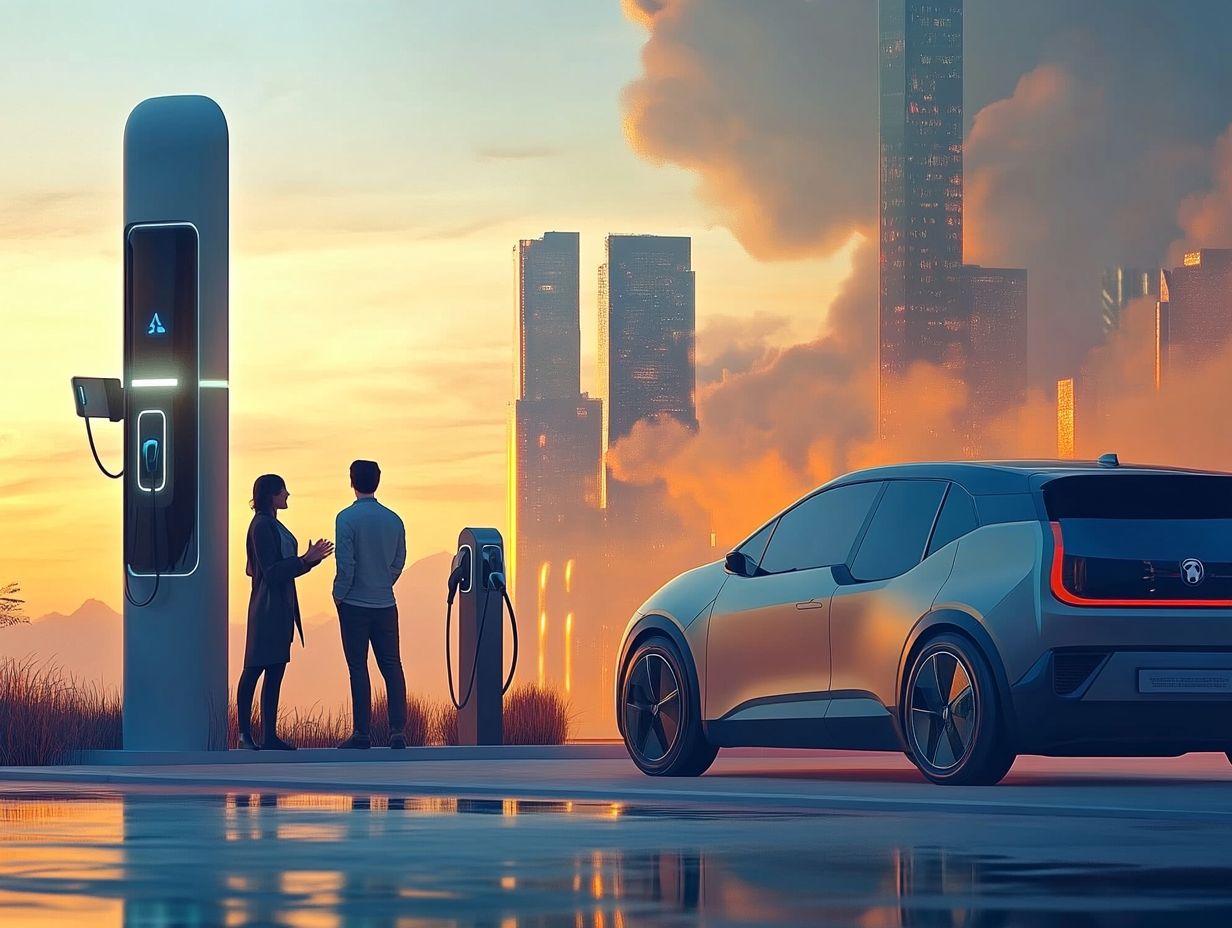
Range and charging concerns often dissuade potential buyers from fully embracing electric vehicles, creating what’s commonly referred to as range anxiety.
However, as electric vehicles gain traction in the market, advancements in charging infrastructure and battery technology have made remarkable progress. These developments have notably expanded daily travel ranges, positioning EVs as practical and appealing options for discerning drivers.
Ready to make a change? Explore the benefits of electric vehicles today!
Addressing Range Anxiety and Charging Infrastructure
We need to tackle range anxiety to help more people adopt electric vehicles. This concern often stems from the perceived limitations of current EV charging options.
Charging technology is advancing quickly. Many new electric vehicles now offer longer ranges, fitting your daily travel needs without the fear of running out of charge.
Significant investments are expanding charging networks, ensuring that you can access reliable and convenient charging options whenever needed.
Fast-charging stations are appearing in urban centers and along highways. This minimizes downtime, making long road trips much more practical.
Innovative battery technologies are enhancing the lifespan and efficiency of EV batteries. This helps dispel worries about battery degradation.
By harnessing renewable energy sources like solar and wind to power charging stations, we cut operational costs and contribute to a cleaner, more sustainable driving experience. This aligns with the growing demand for eco-friendly solutions.
Future of Electric Vehicles
Get ready! The future of electric vehicles is bright and full of thrilling possibilities. It is characterized by swift technological advancements, rising adoption rates, and a profound transition toward sustainable transportation solutions.
The emergence of vehicle-to-grid technology a system where electric vehicles can send electricity back to the power grid, helping to balance energy supply and demand along with enhanced EV batteries, makes mass adoption increasingly attainable.
Improved charging infrastructure is laying the groundwork for the widespread use and acceptance of electric vehicles in daily life. This is an exciting time for those looking to embrace this revolution.
Advancements and Potential for Mass Adoption
Advancements in electric vehicle technology and charging infrastructure are essential for paving the way toward mass adoption. Innovations in EV batteries, such as increased energy storage capacity and faster charging capabilities, position electric vehicles as an enticing option for those transitioning from gasoline cars.
These enhancements minimize the time spent at charging stations and extend the distances you can travel on a single charge, effectively alleviating range anxiety. As renewable energy sources like solar and wind become more common, the sustainability of electric vehicles improves significantly.
This change not only helps the environment but also attracts eco-conscious consumers. The convergence of improved battery technology and accessible renewable energy is setting the stage for a new era in transportation, promising a future where electric vehicles reign supreme on the roads.
Frequently Asked Questions
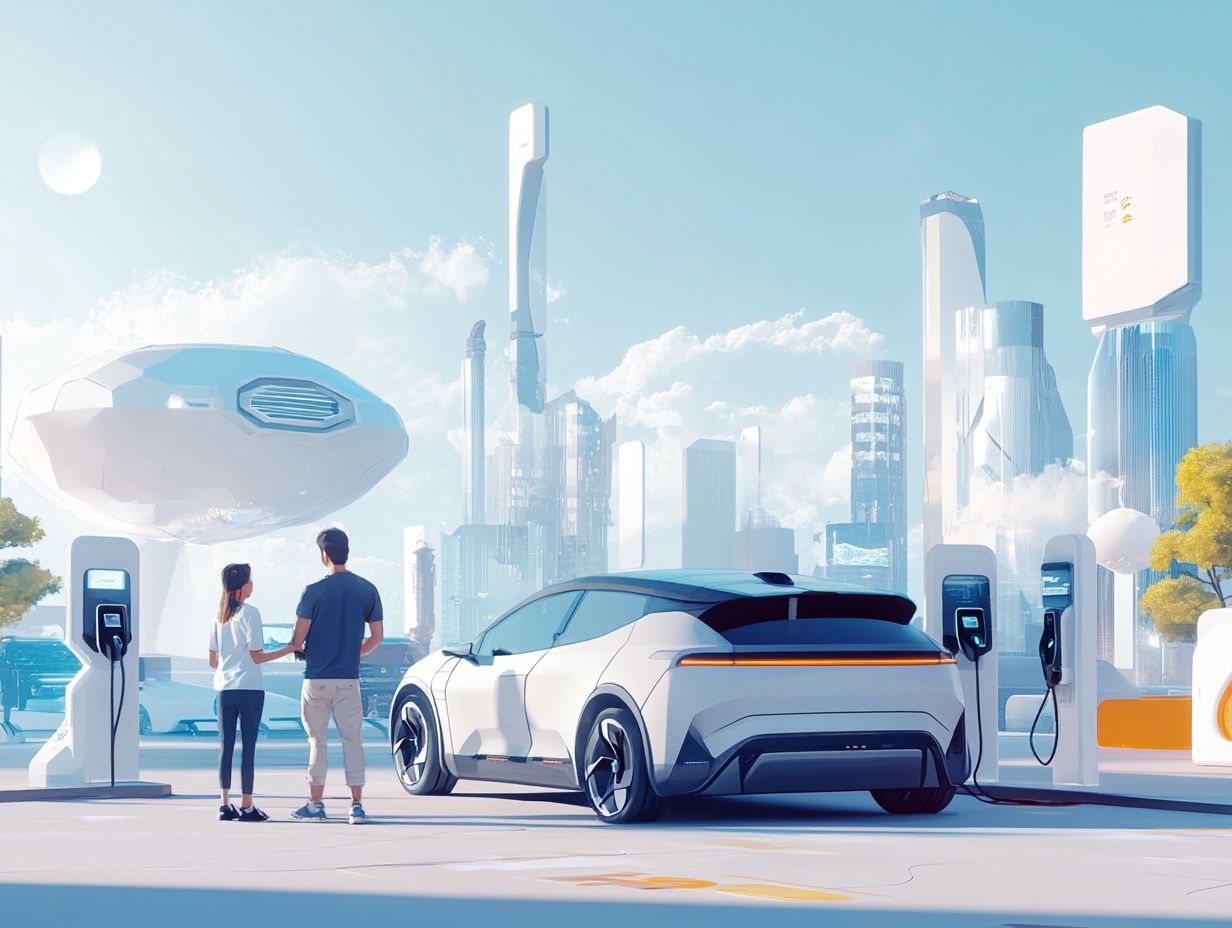
Curious about electric vehicles? Here are some common questions answered!
What are some common misconceptions about electric vehicles?
Some common misconceptions about electric vehicles include that they are slow, have limited range, and are not as environmentally friendly as traditional vehicles. To clear up these myths, you can explore 7 myths about electric vehicles debunked.
Are electric vehicles actually slow?
No, electric vehicles are often surprisingly fast! Some can even outperform traditional cars on the road.
Do electric vehicles have limited range?
While early models of electric vehicles did have limited range, newer models can travel hundreds of miles on a single charge. This makes them a viable option for most daily needs and even longer trips with proper planning.
Is it true that electric vehicles are not as environmentally friendly as traditional vehicles?
This is a common misconception. While electric vehicles do emit some greenhouse gases during manufacturing, they produce significantly less emissions over their lifetime compared to traditional vehicles. As renewable energy sources become more widespread, electric vehicles will become even more environmentally friendly.
Do electric vehicles require special charging infrastructure?
While having access to charging stations can make owning an electric vehicle more convenient, it is not necessary. Most electric vehicles can be charged at home using a standard outlet, and there are also options for fast charging at public stations.
Are electric vehicles more expensive to own and maintain?
Many think electric cars cost more to buy and keep than regular cars. While electric cars can cost more to buy, they save money on maintenance and fuel.
Electric vehicles can feel pricey at first glance, but they can save you a lot in the long run. Imagine spending less on gas and repairs over time!


